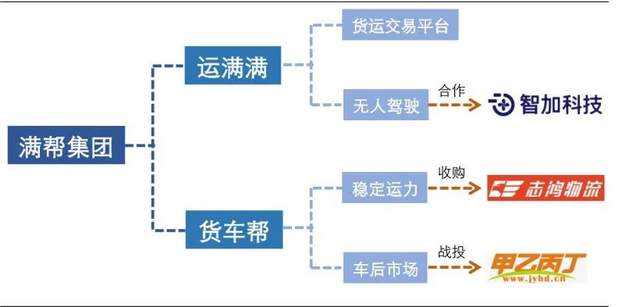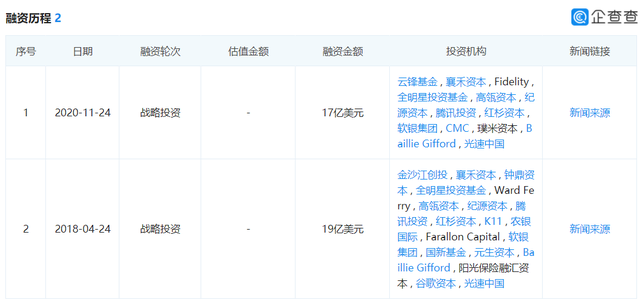How attractive is the Chinese trucking market?
Editor’s note: This article is from the WeChat public account “Capital Planet Planet” (ID: zibenxingqiu), author: Tang Fei, editor: Bell Lu You.
A “big fish” will appear in China’s freight logistics market.
According to media reports recently, the truck logistics platform Manbang Group will formally submit an IPO application to the New York Stock Exchange soon. It plans to raise 1.5 billion U.S. dollars and the company’s valuation may reach 20 to 30 billion U.S. dollars. And this is not the first time that the outside world has learned that this company is seeking to go public.
Man Bang is also called “the Didi in the field of freight” by some people. Its platform uses a mobile app to match drivers and shippers. It mainly charges membership fees on the shipper’s side, and provides supporting financial, insurance, ETC and other services on the driver’s side.
According to public information, Manbang Group was formed by the merger of two truck service platforms, Yunmanman and Vanbang. It is an online freight platform that connects freight drivers and cargo owners with transportation needs based on big data technology.
According to official website data, as of the end of 2020, Manbang Group’s platform has certified more than 10 million drivers, certified cargo owners more than 5 million, and its service coverage covers more than 339 cities.
In this tangible IPO year, “realized profitability” has given the smug Man Gang a little bit of superiority. According to Bloomberg News, in 2020, the company’s revenue increased by 13% year-on-year to 2.5 billion yuan; profit was about 135 million yuan, turning losses into profits.
SoftBank, Google, Tencent, and Ali have endorsed it
In fact, even before the merger, the two companies were valued at more than US$1 billion each, and both are well-known “unicorns” in the logistics industry.
At that time, “Jiangsu enterprises” were full of “Internet + logistics”, traffic big data, and model projects for energy saving and emission reduction. The platform’s real-name registered heavy truck drivers exceeded 5.2 million, cargo owners exceeded 1.25 million, and daily cargo turnover. 13.6 billion ton-kilometers, the daily matching transaction volume is about 1.7 billion yuan.
The truck gang, founded in Guizhou, cooperates with more than 2,000 gas stations and uses big data to support services such as smart recommendation of gas stations, refueling route planning, and peak staggered refueling mechanism setting for hot gas stations, and monthly car fuel value-added services GMV (total turnover) exceeds 150 million.
The thousand-mile “marriage” of the two companies originated from a “chatter”.
In July 2017, Wang Gang, the angel investor of Yunman Man, was still on vacation abroad. While chatting with Xu Xin, the founder of Capital Today, the Chinese version of “investment queen” said: Man and the truck gang should be merged. It doesn’t make sense for the two to burn their money.”
This seemingly unintentional proposal was highly recognized by Wang Gang. He quickly found Yunmanman founder and CEO Zhang Hui to propose a partnershipAnd suggested that the two hit it off. After that, Wang Gang personally visited Peng Zhijian, an early investor in Truck Help and founder of Yuansheng Capital, and quickly reached a consensus.
In November of the same year, Yunmanman and Truck Gang jointly announced a strategic merger, and the two parties will jointly establish a new group company-Manbang Group. After the merger, investor Wang Gang will serve as the chairman and CEO of the group company, while Yunmanman CEO Zhang Hui and trucking CEO Luo Peng will concurrently serve as co-presidents of the group. The new group company will retain the original trucks and Wanman’s brand and continue to operate independently.
In Wang Gang’s view, the merger is “exchanging time for space.” In his words, it is okay for the two companies to continue to fight, and maybe the winner will be divided within ten years, but it is “not necessary”-instead of consuming time, it is better for everyone to build together.
After the merger, in April 2018, the new entity Manbang Group completed a round of financing of US$1.9 billion, with a valuation of US$6.5 billion. The investors at the time were super-luxurious: Sun Zhengyi’s SoftBank Group and Google’s parent company Alphabet’s venture capital funds were among them.
In 2020, Manbang announced that it has received a new round of US$1.7 billion in financing, and investors have joined Ali, Tencent, and other domestic and foreign star institutions such as Fidelity, Hillhouse, and Sequoia.
For the two founders, this can be said to be an early moment of highlight.
Picture source: Enterprise Search
The trillion-dollar market meets hand in hand
China’s road freight industry, where Manbang Group is located, is an extremely large market.
A study by the China Investment Corporation shows that in terms of logistics expenditures, China’s road freight market is the world’s largest, reaching 6.2 trillion yuan in 2020. By 2025, this data is expected to increase to 8.2 trillion yuan, a compound annual growth rate of 5.7%.
On the inter-city freight subdivision track, the advantage of Man Gang is very obvious. According to estimates, the current Manbang Group has won the intercity freight market90% of users have become the industry leader.
Before the merger of Truck Gang and Yunmanman, the two and Fuyou Truck were basically in a three-pronged situation.
The difference lies in the fact that Fuyou Trucks has launched its contract performance platform, which is the whole process of “matching + carrier”. Manbang is more like an online matchmaking platform. The platform itself does not participate in pricing. After the shipper releases the transportation information and the expected price, it waits for the driver to communicate and negotiate the price online.
As for the intra-city freight logistics market, the biggest player at present is Huolala, whose market share once accounted for 50%. This Internet platform established in Hong Kong entered the mainland market in early 2014. With a series of efficient marketing methods, it opened up in a short period of time.
According to public information, as of November 2020, Huolala’s business scope covers 352 mainland Chinese cities, with 480,000 monthly active drivers and 7.2 million monthly active users on the platform.
However, this pattern has changed in the last year.
In April 2020, Didi invested 100 million yuan to establish a freight company. More than two months later, “Didi Cargo” was launched, and in September it announced that the daily order volume exceeded 100,000.
The rise of Didi Cargo is mainly due to the extensive brand recognition formed by “Didi Travel”. This influence is equally effective on the consumer side and the driver side. Many drivers enter the station because they believe in “Didi”. “Didi Cargo”.
Previously, Didi disclosed a round of personnel adjustments through an internal letter: the original two-wheeled vehicle, agent driving, errand running, and freight business were merged into the “urban transportation and service business group”, and the original Didi car-hailing platform company CEO Fu Qiang served as the CEO of the new business group and the director of the safety committee, which shows the importance he attaches to the field of freight.
It is worth mentioning that the above-mentioned companies have all recently been exposed to have IPO plans.
Among them, Huolala was revealed in April that he planned to go to the US for an IPO, with a valuation of at least US$30 billion. As one of Didi Chuxing’s businesses, Didi Cargo will be spin-off and listed as soon as next year.
Fuyou Trucks moved a little faster. On May 13, the prospectus was formally submitted to the US Securities and Exchange Commission, and the trading code was determined to be “FOYO”. The prospectus shows that Fuyou Truck will have revenue of 3.566 billion yuan (approximately US$544 million) in 2020 and a net loss of 116 million yuan.
On the other hand, with the tightening of platform supervision policies, similar companies are at a sensitive moment. According to Xinhua News Agency, on April 30, the eight departments jointly interviewed 10 transportation platforms including Manbang and Huolala. Man Bang was pointed out that the pricing mechanism is unreasonable, the operating rules are unfair, the production and operation are not standardized, and the main responsibility is not implemented.
Compared to the century-old giant UPS?
To some extent, the growth trajectory of Manbang Group is in line with the international logistics giant, United Parcel Service (UPS) in China.The development process of the Chinese market is quite similar.
Intra-city freight logistics is a labor-intensive industry, and there are no absolute technical barriers and high barriers to entry. Huolala and Kuaigou Taxi (formerly known as 58 Express) benefited from crazy subsidies that lasted for many years and achieved good results. Didi Cargo, which has just started for a year, has benefited from its previous operations in the online car-hailing war. Experience has also risen rapidly in the short term.
Manbang Group has been deeply involved in the trunk line business and built a nationwide crossover network. Compared with the single-point network constructed by the same city freight, the national cross network is more difficult to replicate. This is the key reason why many investors have been optimistic about it.
In 1988, UPS built an aviation logistics bridge between China and the United States, which greatly shortened the logistics time between the two countries. Since then, UPS has also established two international transshipment centers, Shanghai and Shenzhen, to further increase the coverage of international freight, and to cover major cities such as Chengdu, Zhengzhou, and Tianjin.
After completing the “mainline” transportation coverage between major cities, UPS quickly improved the ordering process experience and provided visual tracking logistics functions, and densely deployed drones, unmanned driving, and integrated road optimization and navigation systems. Emerging Technologies.
In the 2020 Fortune 500 list of the US, this logistics giant ranks 43rd. As of the close of May 19, UPS reported 213.99 US dollars per share, with a total market value of approximately 186.3 billion US dollars, and a price-earnings ratio close to 36 times. According to Yahoo Finance, among the 27 institutions it counts, currently 5 have given a “Strong Buy” rating, and 19 have given a “Hold” recommendation.
Grasp key nodes first, then cover city clusters, and then embrace the next generation of technology. This may be one of the successful routes for cross-regional logistics companies. However, the problem facing Manbang is that the growth space of the trunk logistics market is close to peaking, and Manbang needs more diversified stories.
After completing the E round of financing, Wang Gang once said, “The next step for Manbang will be new energy, unmanned driving, internationalization and other fields. It will continue to build logistics infrastructure and hope to build it into the world’s largest transport capacity platform. And transportation companies.” In the past few years, Manbang has indeed participated in some artificial intelligence and autonomous driving technology companies in a low-key manner.
Next, it will take time to prove whether the Man Gang, as “the darling of capital”, can take advantage of the IPO and combine the wave of emerging technologies to create long-term value.

